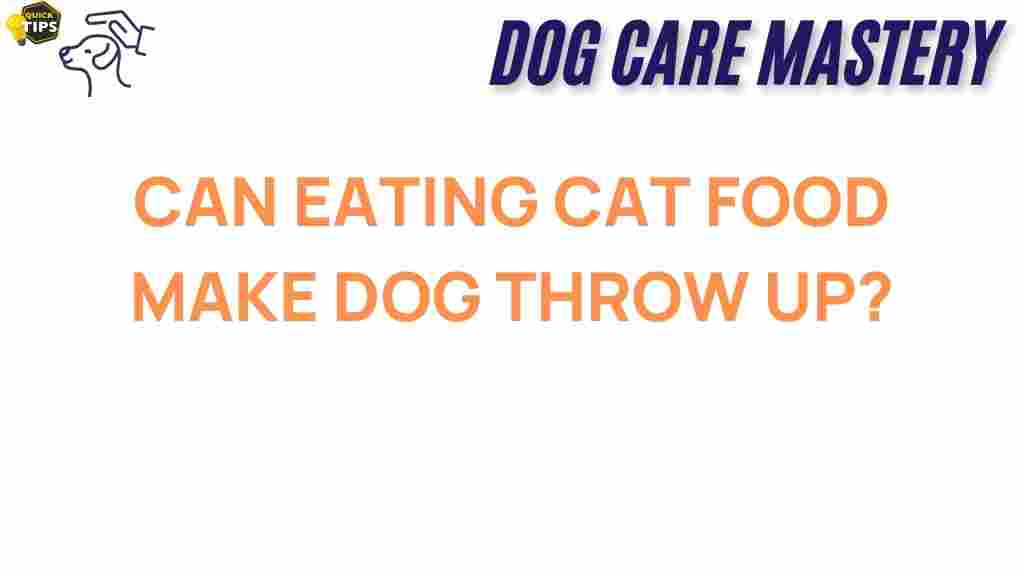Can Eating Cat Food Really Make Your Dog Vomit? Understanding Dog Health
If you’re a pet owner, you may have found your dog sneaking a bite of cat food at some point. This behavior raises a significant concern among dog owners: can eating cat food really make your dog vomit? In this article, we will delve into the relationship between dog health and cat food consumption, exploring the potential effects, risks, and what you should do if your dog indulges in a feline feast.
Why Do Dogs Eat Cat Food?
Before we address the vomiting issue, it’s essential to understand why dogs may be attracted to cat food in the first place:
- Smell and Taste: Cat food often has a more potent aroma and richer flavor compared to dog food, making it appealing to dogs.
- Curiosity: Dogs are naturally curious creatures and may be tempted to explore what their feline friends are eating.
- Protein Content: Cat food is generally higher in protein, which may attract dogs looking for a protein boost.
Can Cat Food Make Dogs Vomit?
The short answer is: yes, eating cat food can lead to vomiting in dogs. However, the reasons behind this reaction can vary.
1. High Protein and Fat Content
Cat food is formulated to meet the nutritional needs of cats, which require higher levels of protein and fat than dogs. If a dog consumes a significant amount of cat food, the sudden influx of these nutrients can upset their stomach, leading to vomiting.
2. Ingredients and Additives
Some cat foods contain ingredients that are not well-tolerated by dogs. Common additives like certain flavorings, preservatives, or even specific types of meat can trigger gastrointestinal issues in dogs, resulting in vomiting.
3. Allergies and Sensitivities
Just like humans, dogs can have allergies or sensitivities to certain ingredients found in cat food. If a dog consumes food containing allergens, it may experience gastrointestinal distress, including vomiting.
Symptoms to Watch For
In addition to vomiting, there are various symptoms that may indicate your dog is having an adverse reaction to cat food:
- Diarrhea: Loose stools may accompany vomiting.
- Lethargy: Your dog may appear more tired than usual.
- Loss of Appetite: A dog may refuse to eat after consuming cat food.
- Abdominal Pain: Signs of discomfort, such as whining or restlessness.
What to Do If Your Dog Eats Cat Food
If you catch your dog eating cat food, here’s a step-by-step guide on how to handle the situation:
Step 1: Monitor Your Dog
Keep a close eye on your dog for the next few hours. Look for signs of vomiting or digestive distress. If your dog seems fine and doesn’t show any symptoms, it may have simply been a minor indulgence.
Step 2: Assess the Quantity
Determine how much cat food your dog has consumed. If it was just a small amount, the chances of serious issues are lower. However, if your dog ate a significant quantity, take precautions.
Step 3: Hydration
Ensure that your dog has access to fresh water. Hydration is crucial, especially if your dog does vomit or has diarrhea.
Step 4: Consult Your Veterinarian
If your dog vomits or shows signs of distress, contact your veterinarian. They can provide guidance tailored to your dog’s specific situation. For more information on dog health and nutritional needs, visit this resource.
Troubleshooting and Prevention Tips
Here are some troubleshooting tips to help prevent your dog from eating cat food in the future:
- Feeding Schedule: Establish a feeding schedule for both your dog and cat. This will help reduce the chances of your dog sneaking cat food.
- Separate Feeding Areas: Feed your cat in a location that your dog cannot access.
- Invest in Dog-Proof Bowls: Consider using elevated or enclosed feeding stations for your cat to keep the food out of your dog’s reach.
- Monitor Interactions: Keep an eye on your pets during mealtime to prevent food theft.
Conclusion
In conclusion, while dogs may be tempted to eat cat food, doing so can lead to vomiting and other gastrointestinal issues. Maintaining good dog health requires being vigilant about what your dog consumes. Always ensure that your dog eats a well-balanced diet specifically formulated for their nutritional needs. If you suspect your dog has eaten cat food and is experiencing adverse effects, consult your veterinarian for professional advice.
By understanding the risks associated with your dog eating cat food, you can take proactive steps to safeguard their health and ensure a happy, healthy life for your furry friend. For more detailed articles on maintaining dog health, check out our blog.
This article is in the category Health and created by dogcaremastery Team
